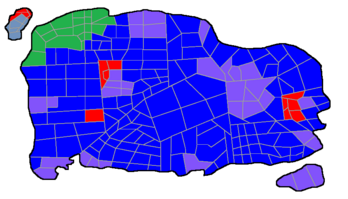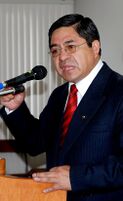2014 Torisakia Federal Election
| ||||||||||||||||||||||||||||||||||||||||||||||||||||||||||||||
All 220 constituencies of Torisakia 111 votes needed to win | ||||||||||||||||||||||||||||||||||||||||||||||||||||||||||||||
|---|---|---|---|---|---|---|---|---|---|---|---|---|---|---|---|---|---|---|---|---|---|---|---|---|---|---|---|---|---|---|---|---|---|---|---|---|---|---|---|---|---|---|---|---|---|---|---|---|---|---|---|---|---|---|---|---|---|---|---|---|---|---|
| Turnout | 52.7% | |||||||||||||||||||||||||||||||||||||||||||||||||||||||||||||
| ||||||||||||||||||||||||||||||||||||||||||||||||||||||||||||||
 Presidential election results map. Blue denotes constituencies won by Dupond/Gosnell, Red by Van Peji/Warren, Purple by Crandall/McBride, Green by Victoire/Natale, and Ruddy Blue by Guerrero/Garcia | ||||||||||||||||||||||||||||||||||||||||||||||||||||||||||||||
| ||||||||||||||||||||||||||||||||||||||||||||||||||||||||||||||
The 2014 Torisakia Federal Election was held on January 7, 2014. It was the 11th election of the Democracy era. Voters elected the president and vice president directly using the first-past-the-post method. The candidate with the most votes in a constituency is declared to have 'won' that constituency and is awarded it. The first candidate to win a majority of the constituencies is elected president. This was a snap election that was called by the majority Conservative congress on October 10, 2013 in response to incumbent president Johnson Crandall's continous pacisfistc response to the growing terrorism issue in Torisakia brought about by the Blue Gods of Death (later FEMOINGOLS) and the Gonzalez Isle Nationalist Movement. The snap election call was made exactly two weeks after Gonzalez Isle Nationalists attacked the city of Paleto Bay and killed 26 people. With the election being held in around three months from the recall, brief primaries and caucases were held across the country that were much shorter compared to a normal election year, which would have been in 2016 had the snap election not been called.
In accordance with the Constitution of Torisakia, congress has the right to call snap federal elections at any point during the current term of the presidency except for the last year of the term. Crandall was a year and a half into his second term as president, following a win in the 2012 election. Congress may only call a snap election with at least two-thirds majority vote by both the House of Representatives and the Senate. On October 10th, during a joint session of Congress, 455 of the 660 members of Congress voted in favor of a snap election, with 158 voting against (mostly New Democrats), and 47 abstaining. The passing of the vote was aided by opponents of the incumbent New Democratic party, namely the Conservative Party and the Gonzalez Isle National Party (GZINP) , combining votes for the snap election in both the House and Senate. In both chambers, the Conservatives and GZINP held enough seats that, when combined, accounted for greater than or equal to 33% of the chamber. This led to the vote already accumulating half of the two-thirds vote needed for it to pass. All 16 members of the GZINP in Congress voted in favor of the snap election, while 204 of the 205 members of the Conservative Party voted in favor (Senator John Dietrick, representing the constituency of Robards in Crandall-Kian Logan, was the lone member of the Conservative Party who voted against).
Incumbent President Johnson Crandall was quickly nominated by the New Democratic Party as candidate, believing that they would again win handidly as they had in 2012. The Conservative Party faced internal conflict when selecting their candidates for the primaries. De facto leader of the party, Senator Joesph Parker, was the initial front-runner for nomination following his semi-successful campaign for presidency in 2012. However, allegations of sexual misconduct by former aides of Parker dampened the Conservative's hopes for nominating him. Another figure quickly rising in popularity in the Conservative Party, as well as with the public, was Senator Rosalind Dupond. Dupond had initially garnered popularity during the early and mid 2000s as the host of the eponymous right-wing radio talk show The Rosalind Dupond Show. In 2009, Dupond ended her talk show to pursue a career in politics. Due to her popularity, she was easily able to run to represent the Conservative Party and her constituency of Yoxall in the Senate, winning handidly in the Yoxall General Election in 2010. While in the Senate, Dupond became a central figure for the Conservative Party due to her natural ability as a speaker and the increasing popularity of right-wing populism within the party. As the 2013 Conservative primaries rolled around and with Joseph Parker no longer an option, many Conservatives turned to Dupond as the face of the party and to represent them in the election. Dupond had already won over most of the country with her rhetoric on combatting the rising terrorism from Gonzalez Isle and its nationalist factions prior to the primaries, and as such was able to swiftly win nomination for the Conservative Party.
The Liberal Party, in the midst of a downward trend in popularity, knew that they stood virtually no chance of winning the election and that it would come down to Crandall and Dupond. Because of this, most members of the Liberal Party favored Crandall, as his platform most closely resembled the Liberal's as a whole, along with the New Democratic Party being an offshoot of the Liberal Party itself. Nevertheless, the party went forward with its primaries, hoping at the very least to steal constituencies away from Dupond and give Crandall a better chance at winning. The party nominated representative Wayland Van Peji from Tokai, who was among one of the 158 Congress members who voted against the election. Knowing he would likely have no chance of winning, Van Peji focused on convincing voters to vote against the Conservative Party and Dupond rather than voting for himself. The Green Party was in a similar boat: they stood next to no chance at winning. They, too, had the idea of trying to steal constituencies away from Dupond. But unlike the Liberal Party, they did not support Crandall as much. Green Party leaders milled around with the idea to not nominate anyone and sit out the election. Arin Victoire, then Governor of Presidents City and member of the Green Party, voluntarily nominated himself for the election, as an attempt to help keep Dupond from winning. Victoire stated in his nomination announcement "[I] cannot say that I am a big supporter of either our current President or Senator Dupond. But I cannot sit idle and let bigotry and depravity win control of our country". After the election, Victoire stated that this election was "a vote for the lesser of two evils, rather than a vote for the best leader".
The Gonzalez Isle National Party nominated Senator Evelio Alemán Guerrero after holding just one primary. Guerrero was said to have won "in a landslide" by the far-right Gonzalez Isle news site La Libertad with over 80% of the vote. Validity of this statement varies between news sources as the GZINP refused make the numbers public, suggesting possible voter fraud. The GZINP mostly stood no chance of garnering any significant votes outside of Gonzalez Isle, given the rising sense of nationalism in mainland Torisakia. Though unlike the Liberal and Green parties, the GZINP fully held the belief that they could win the election, calling on Gonzalez Islanders within the isle and mainland Torisakia to vote "grassroots" instead of "gringo".




